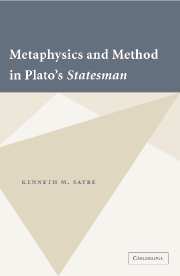Book contents
- Frontmatter
- Contents
- Acknowledgments
- Introduction
- PART I METHOD
- 1 Becoming Better Dialecticians
- 2 Collection in the Phaedrus and the Sophist
- 3 Division in the Phaedrus and the Sophist
- 4 Collection Yields to Illustrative Paradigms
- 5 The Weaver Paradigm
- 6 The Final Definition
- PART II METAPHYSICS
- Appendix: Equivalents for the Great and the Small in Aristotle and His Commentators
- Bibliography
- Index Locorum
- Index of Names
- General Index
2 - Collection in the Phaedrus and the Sophist
Published online by Cambridge University Press: 23 November 2009
- Frontmatter
- Contents
- Acknowledgments
- Introduction
- PART I METHOD
- 1 Becoming Better Dialecticians
- 2 Collection in the Phaedrus and the Sophist
- 3 Division in the Phaedrus and the Sophist
- 4 Collection Yields to Illustrative Paradigms
- 5 The Weaver Paradigm
- 6 The Final Definition
- PART II METAPHYSICS
- Appendix: Equivalents for the Great and the Small in Aristotle and His Commentators
- Bibliography
- Index Locorum
- Index of Names
- General Index
Summary
Overview
This chapter and the next deal with antecedents present in earlier dialogues of the dialectical method exhibited in the Statesman. These antecedents are found primarily in the Phaedrus and the Sophist. A brief overview of these antecedents will indicate why this and the following chapter are needed.
The Sophist and the Statesman are the second and third members of a trilogy beginning with the Theaetetus. The method followed by Socrates in the Theaetetus is an integrated version of the method of hypothesis developed in progressive stages through the Meno, the Phaedo, and the Republic. When Socrates cuts off his conversation with Theaetetus to go meet his indictment, he steps down as discussion leader for the remainder of the trilogy. The Sophist takes up next morning with the introduction of the Stranger from Elea, who leads Theaetetus through the steps of a substantially different dialectical process. This process is commonly characterized as the method of collection and division.
Lest too much be made of the association of different methods with different discussion leaders, we should not forget that the method of collection and division first appeared in the conversation between Socrates and Phaedrus. In point of fact, the Phaedrus is the only dialogue in which collection and division are paired by name as companion procedures. Yet collection is the procedure featured most prominently in this earlier conversation, as we shall see in section 2.2.
- Type
- Chapter
- Information
- Metaphysics and Method in Plato's Statesman , pp. 36 - 51Publisher: Cambridge University PressPrint publication year: 2006



